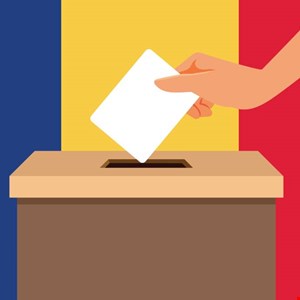A propaganda campaign conducted primarily on TikTok boosted a far-right candidate who topped the votes in the first round of Romania’s presidential election, according to Romanian authorities.
Cǎlin Georgescu, a far-right candidate with pro-Kremlin views, was predicted to receive minimal support in the country’s presidential election, with only 1% of the vote in pre-election polls conducted a month before the November 24 first round. Yet, he unexpectedly topped the results, securing nearly a quarter of the votes, with 22.94%.
However, Romania’s Supreme Council of National Defense (CSAT) revealed in a declassified document that Georgescu’s campaign had been heavily boosted by a wave of messages on social media of people allegedly supporting the candidate.
Romania’s intelligence services (SRI) said the campaign happened primarily on TikTok. It found evidence of over 25,000 accounts which were registered years ago starting to post just two weeks before the election.
Elaborate Propaganda Scheme on TikTok and Telegram
TikTok collaborated with the Romanian government in the investigation. The social media giant stated that the posts were made by a mix of bot and human-operated accounts.
The bot accounts were associated with “unique” IP addresses, which enabled the network to evade detection by the company’s coordinated behavior monitoring systems.
The bots employed identical hashtags and emoji strings to manipulate TikTok’s algorithms and amplify their content. They also featured videos of well-known Romanian athletes and government institutions to create the impression that Georgescu was a widely supported and popular figure.
In reality, Google searches for Cǎlin Georgescu only surged after the election, as most Romanians were unfamiliar with him.
The declassified document also mentioned that Telegram channels and groups were involved in a scheme to pay anyone who boosted Georgescu-themed content and that several Romanian social media influencers received money to promote Georgescu’s candidate. Some have admitted doing so to local media.
Suspicion of Russia’s Involvement
TikTok suspended two clusters of activity associated with this campaign, one of which seems to have connections to the Russian news agency Sputnik.
While the Romanian authorities did not attribute the campaign to any specific countries, the US State Department mentioned a “Russian involvement in malign cyber activity designed to influence the integrity of the Romanian electoral process” in the December 4 advisory.
Additionally, Moldavian reporter Paula Erizanu said tactics were very similar to those used by Russia in the recent Moldovan presidential election.
Romania in Conflict with TikTok
Romanian officials blamed TikTok for several failures related to disseminating propaganda during the presidential election.
The company failed to detect and label Georgescu-themed posts as politically motivated, and when it did act, it only blocked the content for users in Romania, leaving it accessible to international audiences.
Officials argued that this not only violated Romanian election laws but also breached TikTok’s own policies. Despite other candidates properly labeling their content, Georgescu’s political posts gained significant traction among Romanian users, and TikTok did not intervene.
In the aftermath, Romania’s National Audiovisual Council briefly considered blocking TikTok nationwide but ultimately refrained.
However, Romanian officials lodged a report against the company with EU authorities. The European Commission then issued its first retention order under the EU Digital Services Act (DSA), demanding TikTok preserve all relevant data and accounts related to the elections.
On December 5, Romanian prosecutors initiated a formal investigation into Georgescu’s campaign, focusing on money laundering and election law violations, following his claim of spending no Romanian lei on his campaign.
Failed Attack on Romania’s Electoral Infrastructure
CSAT declassified a second document describing cyber-attacks that targeted Romania’s election infrastructure during the election’s first round on November 24.
However, the SRI said the attackers only managed to break into a geographic information system (GIS) mapping server linked to the electoral registry.
The second round of Romania’s presidential election is scheduled for December 8. Cǎlin Georgescu will face liberal politician Elena Lasconi.
